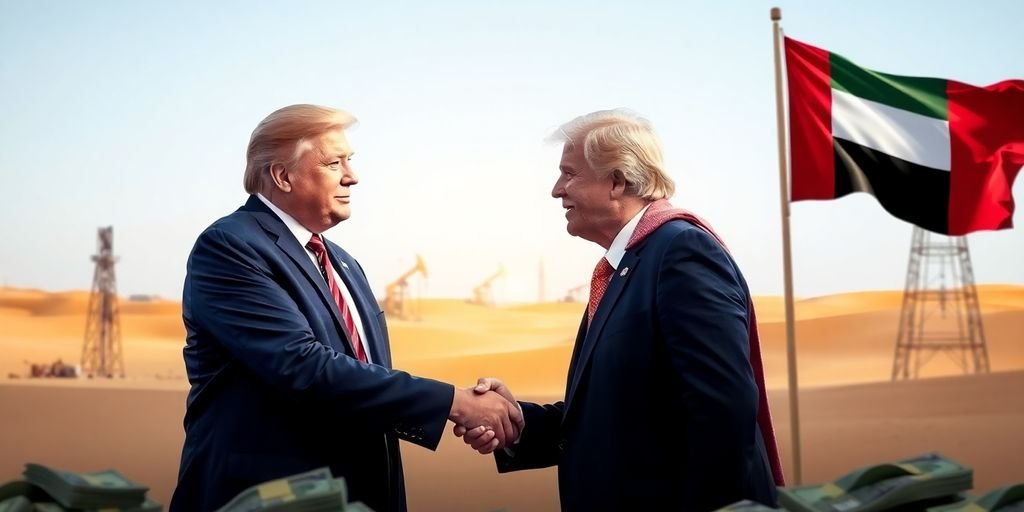Former President Donald Trump concluded his Middle East tour with significant business agreements in the UAE, focusing on advanced technology and energy. The visit, which also included stops in Saudi Arabia and Qatar, was marked by substantial financial commitments and raised ethical questions regarding the intertwining of his family’s business interests with diplomatic efforts.
Landmark Deals and Investments
- AI Semiconductor Agreement: The UAE and US agreed on a pathway for the UAE to acquire advanced AI semiconductors from American companies. This deal is projected to generate billions in business and bolster the UAE’s ambition to become a global AI hub. The Trump administration expressed confidence in securely managing these chips, partly by mandating US company management of data centers.
- Energy Sector Expansion: Abu Dhabi committed to increasing its energy investments in the US to $440 billion by 2035, up from $70 billion. This includes $60 billion in new investments in upstream oil and gas, with US companies like ExxonMobil, Oxy, and EOG Resources participating in UAE projects. ADNOC’s international investment arm, XRG, is also exploring significant investments in US natural gas.
- Broader Investment Framework: The UAE pledged a 10-year, $1.4 trillion investment framework in the US across sectors such as AI infrastructure, semiconductors, energy, and manufacturing. This framework aims to substantially increase existing UAE investments in the US economy.
- Boeing Aircraft Purchase: Etihad Airways committed $14.5 billion to invest in 28 American-made Boeing aircraft.
Controversies and Ethical Concerns
Trump’s tour drew scrutiny due to the expansion of his family’s business interests in the region, particularly a $2 billion investment from an Abu Dhabi sovereign wealth fund into World Liberty Financial, a cryptocurrency venture linked to the Trump and Witkoff families. Critics, including Democratic senators, raised concerns about potential conflicts of interest and emoluments clause violations, suggesting a "quid pro quo" for policy changes like relaxed semiconductor export restrictions to the UAE. The White House, however, maintained there were no conflicts of interest, stating Trump’s assets are in a trust managed by his children.
Diplomatic Shifts and Regional Dynamics
During the tour, Trump also announced the lifting of US sanctions on Syria, paving the way for an $800 million deal between the Syrian government and Dubai-based DP World to develop Syria’s Tartous port. This decision, made without consulting Israel, marked a significant shift in US policy. Trump urged Syria to establish ties with Israel and join the Abraham Accords. Additionally, Trump indicated that Iran had received his administration’s proposal for a nuclear deal, urging swift action.
Special Envoy’s Role
Steve Witkoff, Trump’s golf buddy and special envoy, played a central role in brokering deals, including the Qatar 747 donation and the Abu Dhabi crypto investment. His dual role as a private business partner and diplomatic envoy sparked ethical debates, with critics highlighting the unprecedented nature of such an arrangement. Witkoff’s son, Zach, also reportedly leveraged his father’s connections to promote World Liberty Financial overseas, including meetings with high-ranking officials in Pakistan.
Sources
- Trump wraps up Gulf tour with AI and energy deals in UAE, Reuters.
- Trump and special envoy Witkoff stand to reap rewards from official business | Donald Trump, The Guardian.
- $60 billion in U.S. investments secured by ADNOC during UAE-U.S. business dialogue, Economy Middle East.
- UAE commits to $1.4 trillion US investment, White House says, Reuters.
- Trump Is Visiting 3 Countries Where His Family Business Made Recent Deals, Business Insider.
